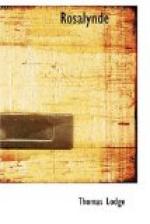without setting them unconsciously to a kind of tune, so essentially musical are the lines. In their wonderful harmony these lyrics remind one of Burns, but in the radiant and ethereal quality of their phrasing they inevitably recall Shelley. Furthermore, these songs illustrate the fact that the Elizabethan lyric had its origin in culture, not among the people, and that the chief sources of its inspiration were Italian and French. In a series of lyrics inserted into the text of “A Margarite of America,"[1] Lodge avowedly imitates the Italian poets Dolce, Pascale, and Mantelli, while in another passage in the same book[2] he expresses his unbounded admiration for the French poet Desportes, and his belief “that few men are able to second the sweet conceits of Philippe Desportes.” His “sweet conceits” are imitated, we are told, in Montanus’s song on page 29, and again in Rosader’s Sonnet, on page 62. In his borrowings Lodge merely followed a prevalent fashion. The early English Elizabethan lyric was wholly experimental and imitative—the product of foreign influences, predominantly Italian and French; and in this respect Lodge’s are entirely typical.
[Footnote 1: Hunterian Club reprint, pp. 76 ff.]
[Footnote 2: Hunterian Club reprint, p. 79.]
Historical Significance. Historically the book is interesting as one of the predecessors of the modern novel. But we need to keep in mind that it is really a precursor of the novel and not the thing itself. We have no right, therefore, to demand a well-constructed plot or skill in characterization, because these did not appear in English fiction till a much later time. It was two centuries before the novel, in the time of Richardson, came into being; and it would be manifestly absurd to expect to find in “Rosalynde” an anticipation either of Scott’s dramatic skill in plot construction or of George Eliot’s clairvoyance that divines the interior play of passion. All that we can reasonably ask is that there be a coherent story told with imaginative skill. In this we are not disappointed. The narrative moves rapidly, at least in the earlier part of the story; and, though in the latter part the setting seems from a modern point of view over-emphasized, it is so charmingly idyllic as almost, if not quite, to justify the over-emphasis. But Lodge really gives us more than we have a right to expect, for, as Mr. Gosse has pointed out,[1] we may trace in the book “certain qualities which have always been characteristic of English fiction, a vigorous ideal of conduct, a love of strength and adventure, an almost quixotic reverence for womanhood.”
[Footnote 1: “Seventeenth-Century Studies,” p. 18.]




